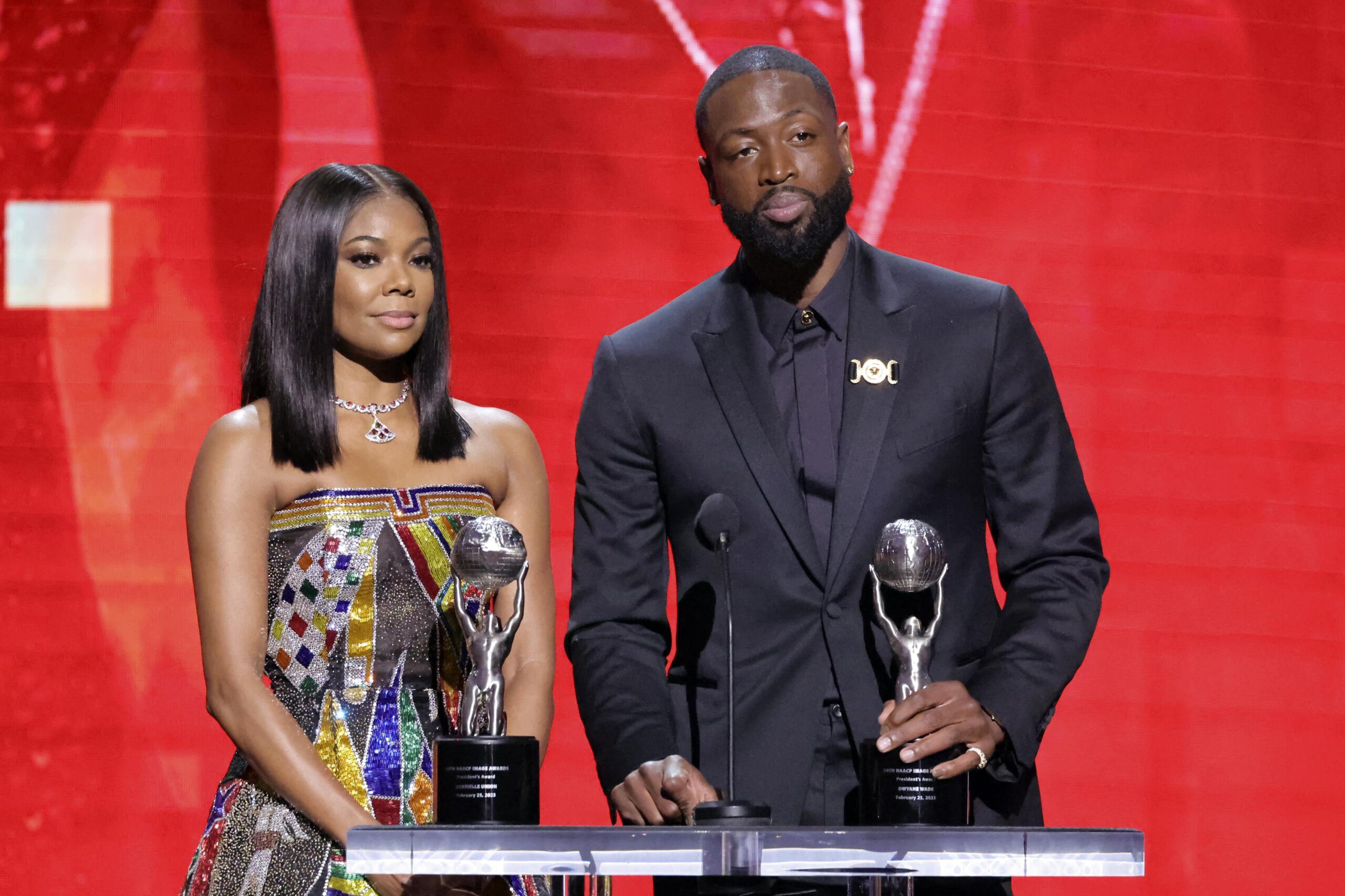Gabrielle Union-Wade and Dwyane Wade were awarded the President’s Award at the 2023 NAACP Image Awards on Feb. 25. . In a spectacular show of love and solidarity, the couple dedicated the award to their trans daughter, Zaya.
“Zaya, as your father, all I’ve wanted to do was get it right,” Wade said during the couple’s acceptance speech. “I’ve sat back and watched how gracefully you’ve taken on public scrutiny, and even though it’s not easy, I’ve watched you walk out of the house every morning as yourself. I admire how you’ve handled the ignorance in our world. I admire what you face every day.”
Union-Wade also used the moment to draw attention to the grim reality Black trans people particularly face. “A new era that demands our collective answer to one simple question: will we fight for some, or will we fight for all of our people?” She went on to say, “Even as we demand equality at the top of our lungs, we consistently fail to extend our advocacy to protect some of our most vulnerable among us. Black trans people are being targeted, terrorized and hunted in this country. Everyday. Everywhere.”
It can’t ever be spoken enough of the importance of two well-known parents taking a public stance; Union-Wade is a legacy actress with a career that spans over 30 years, and Wade is recognized as one of the greatest basketball players of all time, in a sport that has long been plagued by hypermasculinity. A glance at their recent interviews, it’s clear Wade and Union-Wade have continued to double down on supporting their daughter despite criticism from the public and their peers. As they document their journey with Zaya on their social media platforms, their comments sections are often riddled with transphobic anti-Black violence. Wade has even had to confront allegations against his ex-wife who accused the father of making money off their teen. Time and time again, Zaya’s parents have displayed how a parent’s love should have no bounds.
They are not isolated. Far away from the cameras and public attention, parents and supporters are unwavering and intentional in how they are providing support. From Coquitlam to Edmonton and Ottawa, their advocacy has led them directly to the streets in protest in the face of hate. LGBTQ2S+ supporters, adorned with flags, use music to drown out the alt-right protestors as they attempt to disrupt and terrorize community events.
For Ottawa resident Amy Fiawornu, supporting her trans child was not a question. She tells Xtra, “You can’t let your child wait till they’re 40 to breathe. My child needs to be who they are to be comfortable in her own skin.”
Her daughter’s experiences reflect the particular nuances Union-Wade spoke to in her plea at the awards show. Fiawornu details instances of her daughter being misgendered, bullied and targeted without recourse. Teachers and principals lacked sensitivity and knowledge, in turn, harming her trans child.
“Being Black adds another layer,” Fiawornu explains. “My kid is often left wondering if the treatment they are receiving is a result of them being Black or trans. Deep down, I have the same questions.”
Though she describes her daughter as confident and unyielding, Fiawornu admits as a mother, she is fearful. When her daughter was an adolescent, she would call schools to make sure they were LGBTQ2S+-friendly. She removed her daughter if any incidents occurred and talked to the parents of her daughter’s bullies. And she says she had to learn along the way that being an advocate is easier when you can actually face the person targeting the one you love.
When those who target her daughter have the power to change laws that impact her ability to access gender-affirming medical care, create barriers to trans students’ ability to use the names they identity with and ultimately live meaningfully as herself, being her protector is much harder. Fiawornu says, “I live in fear every day of what could happen, I don’t voice it to my daughter because I don’t want to scare her, but I’m nervous.”
She is intentional in shielding her daughter from the negative comments and questions she receives from members of her family and community. Even as far as creating distance between grandparents who disapproved of Fiawornu’s and her daughter’s choices. Fiawornu asserts to her daughter as frequently as she can, “If you cannot be yourself outside of this home, remember you can be yourself in here. As soon as you walk in this door, you’re safe.” From the earliest sign her daughter was questioning her gender, Fiawornu let her wear the clothes she wanted, pick out the toys she wanted to play with and sought community in support groups with other parents of trans children.
For Barrie resident Shelly-Ann Skinner, she’s been an advocate as long as she can remember as a Black LGBTQ2S+ person. However, she notes the weight of it is heavier in supporting a young one. “There’s nothing like being a parent of someone and watching them experience discrimination,” she tells Xtra. “Even if it’s not so blatant and vocal, we know it exists—it exists in all of our systems.”
Similar to Fiawornu, the education system has been especially harmful and difficult for her trans child. She notes, “There are rainbows all over our schools, but the systems are not in place to support gender equity and gender inclusion.” Frequently, she’s had to take it upon herself to address teachers who have made assumptions about her child’s gender.
We don’t have to imagine what a world looks like when parents show their unconditional love and support to their queer and trans children. To be affirmed, supported and protected should not be revolutionary acts, but baseline to what trans children deserve. They prove to be life-saving measures in a world that is past due in recognizing trans autonomy.
“We shouldn’t need public stances to encourage us to support our children,” Fiawornu affirms. “I didn’t need it to love and support my child. We don’t get trophies for feeding our children; it’s what we’re supposed to do.”


 Why you can trust Xtra
Why you can trust Xtra


